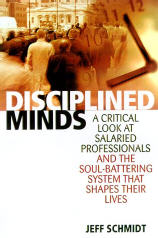Disciplined Minds
A Critical Look at Salaried Professionals and the Soul-battering System That Shapes Their Lives, by Jeff Schmidt (2000)
Read by Lyn Gerry from episodes 175 - 201. List of Episodes
* Audiobook (360MB, 13 Hour MP3 file)
* Audiobook Chapters plus playlist (316MB ZIP file)
* Browse the chapters for download
- http://www.DisciplinedMinds.com, Official website, with details of the court judgment
Episode 339 has an interview with Jeff Schmidt about this book.
This book explains the social agenda of the process of professional training. Disciplined Minds shows how it is used to promote orthodoxy by detecting and weeding out dissident candidates and by exerting pressure on the rest to obey their instructors and abandon personal agendas such as social reform -- so that they, in turn, can perpetuate the system by squeezing the life out of the next generation.
Shortly after writing this book, Jeff Schmidt was fired from his position as Editor of the academic journal, Physics Today. After many years of legal battling, he was judged to have been dismissed without good cause, awarded a considerable sum of damages and reappointed, whereupon he swiftly resigned.
Reviews
John Pilger begins his review entitled 'Brainwashing the polite and professional way' by referring to this book as "one of the most original and provocative books of the past decade". The book's theme, writes Pilger "is postmodern America but also applies to Britain, where the corporate state has bred a new class of Americanised manager to run the private and public sectors: the banks, the main parties, corporations, important committees, the BBC". He proceeds to cite a string of examples which underscore how relevant Schmidt's analysis is to understanding the "corporate coup d’état" that has swept through Britain, and attempted to destroy alternative visions of how we might live.
The book has generally been favorably reviewed, with one reviewer calling it "bold and refreshing" and noting that "Schmidt’s voice has the authenticity of experience and concern, and thus has a much more subversive quality" than the traditional sociological approaches.<ref>http://www.uow.edu.au/~bmartin/pubs/01BRrt.html</ref>
By Chapter:
|
<references/>
